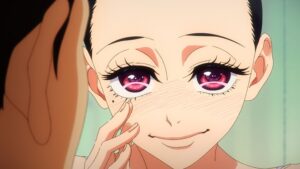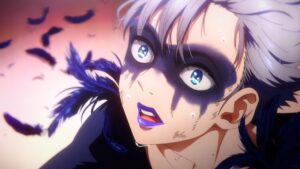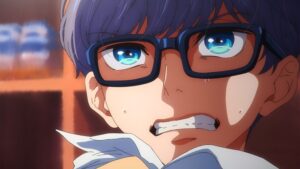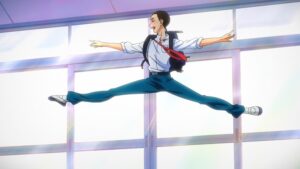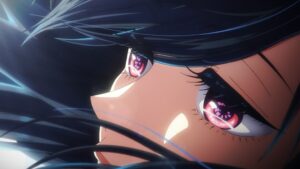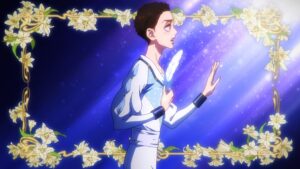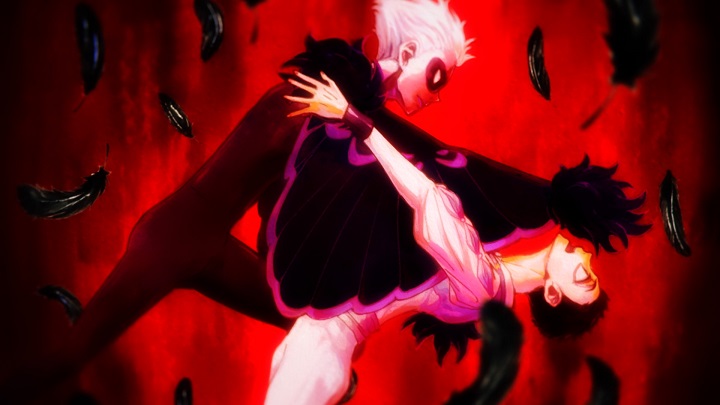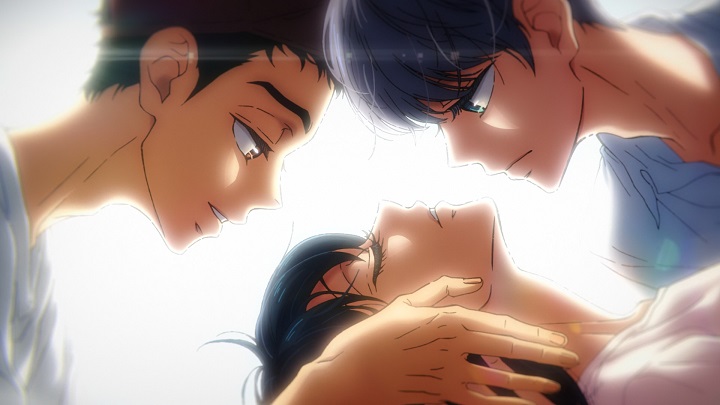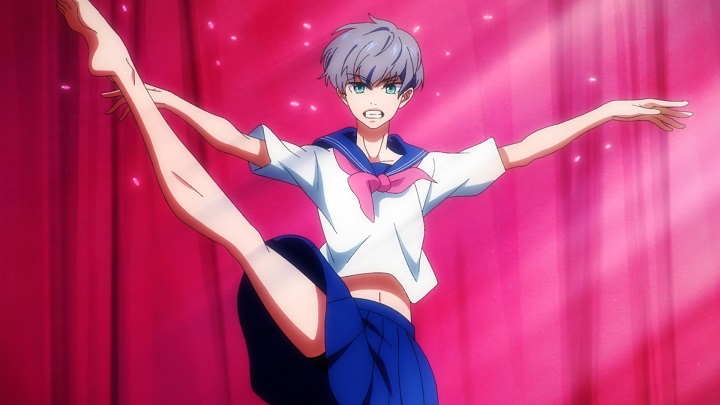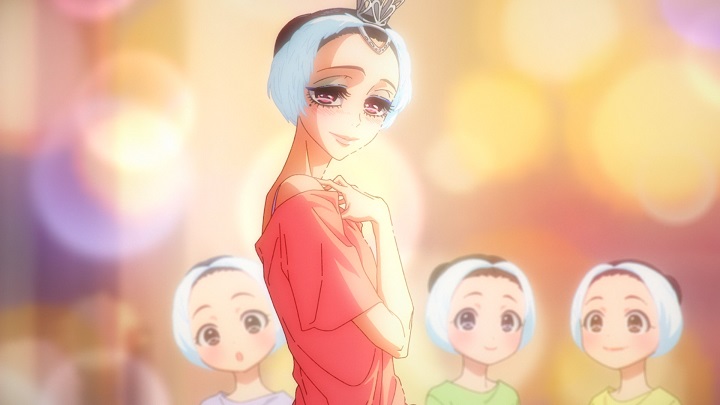Everyone has a type. Whether it be fighting games, Shounen battle anime, even who they like to date. Everyone has something that they can point to and say “I like that, give me more”. Well after 450 anime, after Welcome to the Ballroom, Princess Tutu and so much more, I think I’ve figured out one of mine: Fancy dancing. And after this season, I think I can narrow it down even more: Ballet dancing. The entire aesthetic is something I can’t get enough of. And it’s thanks to the subject of this review, my favorite anime of the Spring 2022 season, that I figured that out. Produced at Studio MAPPA, originally created by George Asakura, Directed by Munehisa Sakai of Zombie Land Saga with music by Michiru I give to you: Dance Dance Danseur. Let’s jump into it.
Be warned, this review contains minor unmarked spoilers for Dance Dance Danseur. It also contains major spoilers in some sections, but these will be heavily marked to avoid accidents.
Visuals
As always, what with anime being a visual medium, lets talk about how Danseur looked. Because if I may be so bold to say so, Danseur looked good. The shot composition, lighting, color design, editing, it’s all beautiful. It’s only slightly hyperbolic to say that there are more frames of Danseur that are background-worthy than there is those that aren’t. A weird sentence, but stick with me here. The scenes in Danseur stick in your mind. They encapsulate the tone of a scene, the emotional weight, and convey it without the need for narration or a character explaining it to the viewer like we are 5. Whether it be the last innocent days of a child’s summer ballet class or the closing twilight of an older students last shot at success, you feel it through nothing more than a picture. In a word, Danseur is picturesque.
What do I mean by picturesque? Simply that Danseur focuses more on striking, singular frames than it does complex or bombastic animation. The animation exists, and it’s often rather good. But most of the time it’s restricted to subtle, graceful character movements. Beautiful arcing jumps, smooth bends and spins, really dialing in on the elegance of ballet as an art form, rather than the big dynamic set-pieces of action Shounen. Those exist as well, episode 5 in particular has what I would call a rather explosive and dynamic scene. But it’s not Danseur’s focus. And even then, what with this being MAPPA, it isn’t perfect. Especially in the latter half, Danseur’s animation has a few stumbles. Maybe production melted some, or they got a bit to ambitious, I don’t know. And I probably never will. What’s important though is that the elegance and beauty of the ballet aesthetic never wavered.
And what an aesthetic it is. I said above that I had discovered my “type” with this show, and I truly believe that. Ballet as a subject matter lends itself incredibly well to this kind of picturesque approach. The dancing, the stories, all of it is about big dance movements that can be seen across an entire theater. These exaggerated poses and sweeping legs or arms, engaging the entire body in the performance. So when an anime does its own exaggeration, none of it feels out of place. Instead it’s like the anime is leaning into the art, treating the entire show like it’s own play. As if the characters are on a stage, dancing and acting, even when narratively they are just hanging out at school. A big, dynamic pose or over the top facial reaction? It’s a performance. It fits. And this applies throughout the entire show.
The real concern I have is in regards to character design. Some viewers may find the long necks and elongated bodies off putting. It definitely makes the characters, all of whom are in middle school or younger, feel much older than they actually are. In some ways this helps to augment the portrayal of grace and elegance Danseur is going for. In other ways, I have to actively remind myself that Miyako is 14 years old and maybe I should calm down a bit, because my god does she look good. On top of that, I also think the eyes are weird. The arcs look great in closeups where Danseur has the detail to taper them off in the middle, but they look absolutely terrible in the wide shots with their singular widths dominating the eye. Eventually you get used to it, but it definitely took me a while.
Anyways, all in all I would say that Danseur looked absolutely gorgeous. The animation is inconsistent, with a few CGI scenes, bits of reused animation and some melt near the end, but the camera work, shot composition and coloring all stay incredible the whole way through. As far as MAPPA productions go, this is one of my favorites.
Narrative/Setting
This brings me to the narrative, the story, of Dance Dance Danseur. At it’s core, Dansuer is a story about young love, passion, and deciding your future. In Danseur we follow our lead, Jumpei Murao, as he rediscovers his passion for ballet after an encounter with the beautiful Miyako Godai and attempts to become a renowned Danseur Noble, a leading male ballet performer. Along the way he meets Luou Mori, a rival in love and ballet, colliding in both. On the surface, this sounds like a pretty standard love triangle type deal. Boy meets girl, boy has competition, which one gets girl. But what sets Danseur apart are all the little details. Whether it be the “why” behind every action the characters take or the way the whole thing is framed liked a modern interpretation of Swan Lake, Danseur feels different. It feels good.
This is where I have to get into some spoilers if I want to talk about Danseur in a meaningful way. If you haven’t seen the show and don’t want to be spoiled let me give you a quick endorsement: Danseur is really good. While the overarching story about ballet and love triangles is pretty straight forward, the character dynamics are anything but. The relationship between Jumpei, Miyako and Luou is what really sells the drama. Watching Jumpei struggle between love, passion and career, learning why Luou acts and feels the way he does, experiencing Miyako’s struggle between the two. Unlike most love-triangle type romances, there’s nothing vapid or trite about Danseur’s conflict. And I love it because of that. So if you just want a recommendation, and if you love character driven drama’s, then please watch Danseur. Now on with the (minor first-half) spoilers!
Lets start with Jumpei, easily my favorite character of the show. Jumpei’s arc in Danseur is one of passion and self-acceptance. Of figuring out that being “cool” or “manly” isn’t about your hobbies or what you enjoy, it’s about how you treat and stand up for others. Early on in the show Jumpei is caught up in this idea that he has to be “a man”. That guys can’t enjoy ballet, they have to do Jeet Kune Do. Of how he has been pushed into following the same path as his dad because stunt work is “manly”. And it’s over the course of Danseur’s first half, when he meets Luou and Miyako, that he is finally able to break out of that restricting, and ultimately toxic, view of masculinity. That embracing and doing what he love’s is all that matters.
Once you introduce Luou though is when things get interesting. Danseur initially sets them up as the classic raw talent vs hard work rivalry. But as the series progresses we learn this isn’t truly the case. Jumpei is the one born with a body for ballet who never got to use it, while Luou’s was forced over many years of painful lessons into what it is today. Jumpei is the one seeking a more technical, classical, ballet experience while Luou’s story is all about discovering his own passion, of learning to let go and express himself. Danseur sets them up as representatives of classical and contemporary ballet, only to switch which side you would expect them to be on as both need different things from the art. All the while bouncing off of and pushing each other higher. Not to mention the Rothbart/Siegfried and Swan Lake parallels present throughout.
The only issue with Luou is that sometimes, ok most of the time, Danseur lays it on pretty thick. I’m talking multiple flashbacks across multiple episodes, hammering the point home over and over again. There isn’t much room for subtlety when it comes to his story. From the first episode we meet him, all the way up to the finale, Danseur kind of just beats you over the head with his sad backstory. Now to be fair, this backstory does have a reason. The payoff at the finale is absolutely incredible. But the fact remains that you will probably get tired of hearing about his mother and grandmother before the end. And from what I’ve heard, this is even less than the original manga throws at you. I just wish Danseur had handled this with a bit more tact is all.
Of our core three, Miyako is the only one who feels a bit left out. Her role in the story at this point is more of a catalyst for Jumpei and Luou than one of personal agency. She pushes Jumpei to dance, and in the process they find something greater. But in doing so Miyako takes away the one thing Luou truly cared about, pushing him even further into his shell, eventually forcing her to choose between the two. This is compelling stuff, and the choice was truly Miyako’s and no one else’s, which is nice. The fact remains however that she exists more to enable the boys stories than her own sake, at least in this first arc. Danseur has set up plenty of threads for Miyako to explore if it gets a second season, her relationship with her mother and her own desire to dance for example.
All in all I would say that Danseur has a very straight forward main plot, with 2 engaging and emotional character driven subplots. The overarching story provides a good setting, a good framework, for these characters to exist and interact in. Enabling them to tell a tale of love, loss, passion, and freedom that is one of my favorite of the 2022 year so far. I cannot wait to see where it goes from here, hopefully it gets a second season.
Characters
And would you look at that, we are still talking about the characters! Rather than talk about our leads again, since so much of the story is focused on the characters rather than some greater world-wide threat like in a Shounen battle series or fantasy epic, I instead want to take this moment to talk about the side-characters. The rest of the cast outside of our main trio. Not because there isn’t a lot to talk about, there certainly is. But more because I want to leave something for you to discover when you watch the show yourself and I’d rather not repeat myself a bunch.
So, the rest of the cast… Are any of them actually worth talking about? Well yes and no. Part of the problem with Danseur investing so heavily into its main trio is that it does so almost to the exclusion of everyone else. The rest of the supporting cast exists, yes. They have names, histories, personalities, and ostensibly goals. And for a few of them we even get to see those! Natsuki has an interesting relationship with her mother and becomes a tempting rival to Miyako. Meanwhile Chizuru and Oikawa represent two different ideas of teaching, of ballet, and it shows in their characters. But even then I wouldn’t say any of them are… compelling. Indeed, I think there’s only one compelling supporting cast member in the entire show: Misaki.
Misaki is a character we meet in Danseur’s second half, so I won’t spoil anything beyond his introduction and what Danseur tells us early on. Misaki exists as a contrast for Jumpei/Luou. A representative of the cutthroat world of ballet. There are only so many opportunities in dancing. And for Jumpei/Luou to succeed, someone else has to fail. So when Jumpei, who has only been doing ballet for a short time, bursts into the world of ballet and starts rising, Misaki views this as taking opportunities that he hadn’t earned. Where Jumpei only just appeared, Misaki has spent years dedicating himself to this. Essentially, Misaki exists as a classic obstacle for the leads to climb over, though a much more human one than most series have. And watching him struggle against that, successfully or not I won’t say, is the most engaging any supporting character gets.
Aside from Misaki however, I wouldn’t say anyone really stands out. Danseur has a decently sized cast, what with Miyako’s family, the ballet school, Jumpei’s friends, etc. But only 2, maybe 3 of them, really get any kind of attention. The rest, such as Yamato or Kotobuki, exist to fill scenes in the background or make a class feel more alive. They provide an emotional audience to react to events happening and sort of nudge the viewer along in how to feel. None of them get any real development or arc outside of pushing the leads forward, or connecting with them emotionally. This is of course better than the supporting cast being an active determent to the show, and it’s unreasonable to expect them all to be treated like mains. It is a bit sad though when a series really only has 2, maybe 3 characters worth caring about.
Ultimately though this isn’t that big of a mark against Danseur. It’s a character driven love triangle, and that triangle is absolutely fantastic. Would it be nice to have a more fully fleshed out cast? Yes. But does what Danseur have now do the job and support the main trio well enough? Also yes. At the end of the day, the emotional core of Danseur is solid. No, more than solid, it’s fantastic. And that’s enough to earn my endorsement.
OST/Sound Design
Finally we have music and sound design! Sadly, Danseur’s OST is not yet publicly available, so I can’t link it to you like I usually do. Luckily however, a lot of the OST uses existing music like Tchaikovsky’s Swan Lake or more contemporary insert songs. And what songs they are. I realize this is sudden, but Danseur has easily my favorite insert song of the last maybe… decade of anime that I’ve watched? I’m talking about “Rosie” by The Roosters. I wasn’t expecting a 1980’s J-Rock song in a show about ballet, nor did I think it could fit so perfectly. But the Danseur uses its music is just as good as the music itself. In this case fitting into a moment of extreme repressed desire from Jumpei as he struggles to express himself through anything but dance. And this usage extends to the classical pieces as well!
Now I know this may surprise some of you, but Tchaikovsky is pretty good at what he does. There’s a reason Swan Lake is one of the most popular and iconic ballets ever created. The music is simply incredibly. Take the “Swan Theme” for instance, and the way the soft strings rise as love is found, before being thrown aside by Rothbart’s blaring horns. Or the whimsical nature of “Dance of the Little Swans”, the flutes and strings dancing just as much as the feet. The story of Swan Lake is told just as much through its music as it is the dance in my opinion. Which is why I think that, when used properly, it’s never a bad move for an anime to make use of these existing classical pieces. Turns out, using the music from the ballet that your entire story is framed around isn’t a bad idea!
The only downside is that because of how powerful the Tchaikovsky pieces are, I can’t really remember any of Danseur’s own original OST. I’m sure it was there. I sort of remember some generic piano or guitar pieces in the background meant to augment some scenes where loud, classical ballet music wouldn’t necessarily fit. And I thinking about it now, I do recall some piano and strings in some flashbacks. But these all kind of blend together in my mind, leaving room instead for the much more memorable and iconic Tchaikovsky. Maybe I’ll change my mind when the OST comes out and I can listen to it in full. For now though? Danseur’s only memorable music is the stuff that’s been memorable for over a hundred years.
As for the sound design side of things? Danseur does that just as well. It’s subtle, but Danseur absolutely nails the sounds of ballet. The pitter patter of a dancers feet just barely striking the floor. The woosh of air as the stride past each other. How each of their steps is in time with the music of the performance, really emphasizing their grace and the rhythm of their dance. Even the little twinkling in their eyes as their passion alights. Danseur’s sound design isn’t bombastic, there won’t be any explosions, fights or many loud sounds at all. Instead its quiet, subdued, dare I say elegant. And for a show about ballet I think that’s pretty damn fitting.
So all in all? I’d call the sound design and music choice a success. Not a terribly original one, most of their work was already done when the play was first made. But considering how many anime still misuse iconic classical music, I think it still worth giving Michiru and Munehisa Sakai a pat on the back.
Ballet is the Best Aesthetic
And with that we come to the end of the review! All that’s left is this little person section of mine. It has no baring on final score nor is it an in-depth look at any one part of the series. This is just my spot to take off the reviewer hat and ramble about my personal experience with the show. If that doesn’t interest you, or you haven’t finished the show, then feel free to skip! This will 100% contain spoilers after all. But if you want a peak into my head before you read the final conclusion than read on.
At the very start of this review I said that dancing, and more specifically ballet dancing, was my type. Or one of them at least. And the reason for that is very simple: I think that the ballet aesthetic, the very nature of ballet as an art, is perfectly suited for anime. Like I said in the visual section, ballet to me is an art of exaggeration. Of distinct and emotive poses, of spotlights and matching movement to music, of being extra. And what does anime do all the time with its overreactions, sweat drops and gag posing? The exact same thing. Modern anime slots almost perfectly into ballet. It gives the over the top anime reactions a sense of grounding, of purpose, because the very subject matter itself is exaggerated.
And of course this relationship goes both ways! Where ballet gives the over the top nature of anime a grounding in reality, anime exaggerates the reality of ballet. All the beauty, the elegance, even the lighting, stages and dances themselves? All exaggerated. Characters are taller, thinner, lankier, their necks and collars are more pronounced, the legs and curves stand out, even the way light falls on characters bodies or silhouettes them against the backgrounds. It all serves to highlight and push to the forefront of our minds the beauty and grace with which the characters move. Just like anime lets self-insert as their imaginary, ideal selves, so too does it portray ballet, and other sports, as their idealized forms.
On top of that I also believe that the stories ballet tells are well suited to anime. Now of course part of this is just that Swan Lake is a good story on it’s own, and one worth watching. However another part is that, unlike manga, novels, or god forbid light novels, ballet has an established audio-visual style. The outfits, the music, the stage and spot lights, it all informs the production staff before they ever truly begin on a project. Have you ever heard the phrase, “Constraint breeds creativity”? How constraints give focus, forcing people to come up with creative solutions rather than just the “easiest” solution? Well the same holds true here. Anime have to work within the constraints, within the style, of ballet. And I believe that added structure gives them a sense of purpose that many anime just… lack.
As an example, lets take a look at Swan Lake and Danseur. At its core Swan Lake is about longing and jealousy, hope and treachery. It is about Siegfried pledging his love to Odile. thinking her Odette. Of being tricked into giving your word to someone who wasn’t who you thought. Are you noticing it yet? How Jumpei is stuck between passion for ballet and love for Miyako? How he can’t tell which is more important, only for them to separate for Luou’s own mental health? Which was the true Odette in this situation. Does he truly love classical ballet over contemporary, or did he trick himself for the sake of another? And what about Miyako? She could be called the titular princess and yet does she not make a similar choice herself? Danseur takes the idea of Swan Lake and applies it differently to all three of our leads.
And that, I think, is the core of why I enjoy Danseur so much. It’s telling the story of Swan Lake in such a way that it has many different interpretations based on what you are looking for. Want a show without romance? Then its about Jumpei fighting between classical ballet vs contemporary, with Miyako and Natsuki as the representatives of each and Oikawa as his Rothbart. If you do want romance? Then lets make it about love, freedom and passion embodied by Chizuru’s studio and Miyako vs career, fame and acclaim. And these are just a few looking at it from Jumpei’s perspective! You could also do Miyako, as she chooses her own Odile/Odette, or Luou and his own road of discovery and passion. There are just so many possibilities.
What I’m saying is that, and I’ll move it outside the spoiler so the people who haven’t seen the show can read it to, Danseur’s decision to tie itself so firmly to the tale of Swan Lake is in my eyes nothing less than the best decision it could have made. For those that know the story, we know that however happy these characters are, there is no happy ending waiting for them. Meanwhile for those who don’t they get to see it retold in a myriad of ways in a modern drama. Bringing a, admittedly highschool drama-y, version of it to new, modern, audiences. And I think that’s just a treat.
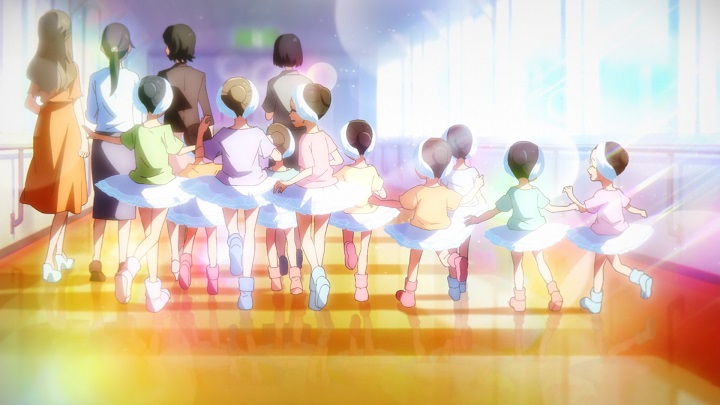
Conclusion
So yeah. In case my long winded rambling, almost 1000 words in that personal section alone, hadn’t made it obvious enough: I think Danseur is really good. Easily my Anime of the Spring 2022 Season, and an early contender for Anime of the Year. It has a few missteps here and there, some growing pains such as its large but ultimately uninteresting cast, its incredible reliance on Tchaikovsky, and the complete lack of subtly with Luou. But none of those are so bad as to overshadow the absolute brilliance that is the rest of the show. I legitimately cannot wait to finish this review just so I can go read the manga. I’m going to be a little sad to lose MAPPA’s hard work with the coloring, lighting and animation, but I have to know what happens next. And as I read, I will be praying for a Season 2.

